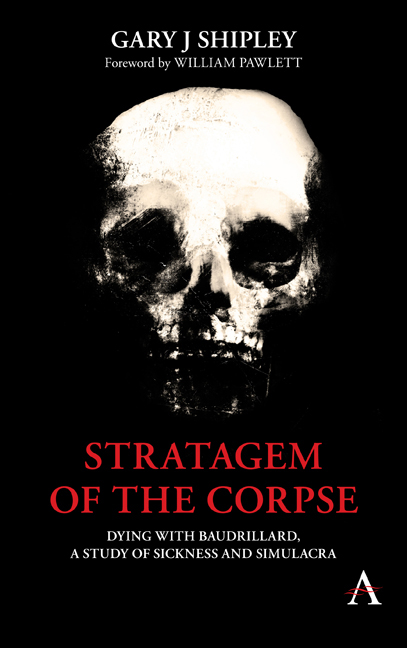Book contents
- Frontmatter
- Dedication
- Contents
- Acknowledgements
- Foreword by Pawletts William
- Introduction
- Chapter 1 On Decay and Other Synthetics
- Chapter 2 Stratagem of the Corpse
- Chapter 3 A Bleak Non-History of History
- Chapter 4 The Hyperactivity of Objects
- Chapter 5 The Unnamable Catastrophe
- Chapter 6 A Cure for Vertigo
- Chapter 7 Chance and the Temporality of Death
- Chapter 8 The Possibility of Nihilism
- Chapter 9 Smell-O-Vision: The Murder Show
- Chapter 10 The Evil Death
- Chapter 11 False Confessions and the Madness of Death: Making Death Speak
- Chapter 12 Black Light: Nigredo and Catastrophe
- Appendix 1 Whiteout: Spatiotemporal Interstices, Necropresence and the Immortality of Now
- Appendix 2 Pure Dreaming: Radicalized and Vermiculated Thought, or Death as an Earworm
- Appendix 3 The Non-Existence of the Scream
- Index
Foreword by Pawletts William
Published online by Cambridge University Press: 20 February 2020
- Frontmatter
- Dedication
- Contents
- Acknowledgements
- Foreword by Pawletts William
- Introduction
- Chapter 1 On Decay and Other Synthetics
- Chapter 2 Stratagem of the Corpse
- Chapter 3 A Bleak Non-History of History
- Chapter 4 The Hyperactivity of Objects
- Chapter 5 The Unnamable Catastrophe
- Chapter 6 A Cure for Vertigo
- Chapter 7 Chance and the Temporality of Death
- Chapter 8 The Possibility of Nihilism
- Chapter 9 Smell-O-Vision: The Murder Show
- Chapter 10 The Evil Death
- Chapter 11 False Confessions and the Madness of Death: Making Death Speak
- Chapter 12 Black Light: Nigredo and Catastrophe
- Appendix 1 Whiteout: Spatiotemporal Interstices, Necropresence and the Immortality of Now
- Appendix 2 Pure Dreaming: Radicalized and Vermiculated Thought, or Death as an Earworm
- Appendix 3 The Non-Existence of the Scream
- Index
Summary
Did you ever get the feeling that critical and expositional works on Jean Baudrillard were missing something? Something important, but hard to pin down? That they were missing something of what might, loosely, be called the radicalism of Baudrillard's ideas? Shipley's work is one of the rare exceptions. Some of Baudrillard's best-known, but least understood, ideas are here unleashed, freed of the disciplinary apparatus of academic convention – and rightly so. When higher education has abandoned all pretence that ideas matter, why should ideas be pressed into the service of this ‘spiralling cadaver’, this ‘zone of surveillance’?
Baudrillard's notions of simulacra and simulation have indeed suffered a fate worse than death; they have been reduced to a pulp and then reconstituted as supplements to the inventory of banal notions – globalization, mediation, performativity – that constitute media, cultural and communications studies in the twenty-first century. Shipley, in contrast, finds in Baudrillard what was always there, and reanimates what was killed off: the corrosive, pataphysical effects, the diabolical ambivalence and the deathly irony. Shipley also reminds us of something we had almost forgotten: Baudrillard was serious, and he often takes us just a little further than we want to go.
The author examines the many guises of death in Baudrillard's thought: the medical and technological processing of death; the production of cadaver as ‘stuffed simulacra’ and the commodification of death; virtuality and the expulsion of death at the core of the social; the denigration of the dying and the dead, but also death in its symbolic and fatal forms: disappearance, suicide, the uncanny appearance of the double that foretells death as inescapable destiny, the radical otherness of our own death. Yet death is also examined here in ways that are far from familiar, that are not pursued by Baudrillard but are not absent from his work either: death without end, immunology and virology; death than resists both meaning and non-meaning; death which refutes the comforts of nihilism and atheism – which are today the very strategies of the system of control.
Shipley's work is rare in reading Baudrillard's post– Symbolic Exchange and Death work against the earlier work; Seduction, Fatal Strategies and The Perfect Crime are central to this new reading.
- Type
- Chapter
- Information
- Stratagem of the CorpseDying with Baudrillard, a Study of Sickness and Simulacra, pp. xi - xiiPublisher: Anthem PressPrint publication year: 2020



